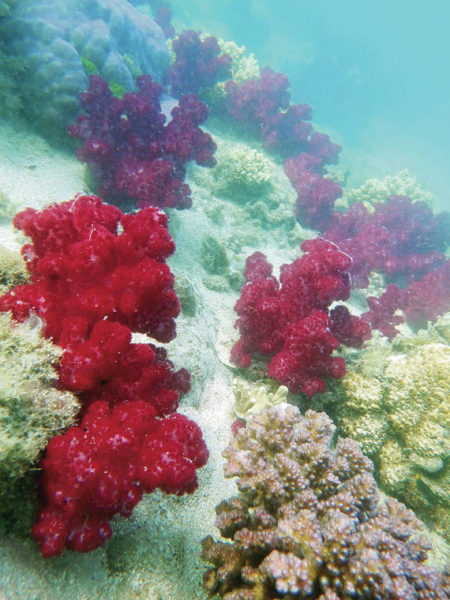Published in the Ocean Watch column, Honolulu Star-Advertiser © Susan Scott
October 26, 2019
Great Barrier Reef Marine Park, Juno Bay, Australia >> One of my favorite places in the world to anchor our 37-foot sailboat Honu is here in Juno Bay. The anchorage lies off the close-set islands of Fantome and Orpheus, and although the rolling green forests of these national parks are lovely, that’s not why this is a must-stop anchorage.
What I love is the narrow crack between the two islands. One side of the channel, about a football field wide, is deep enough to drive Honu through, but it’s the shallow side that draws me. The channel’s formal name is Fantome Pass, but to Craig and me it’s the Pom-Pom Channel.
 Bright red pom-pom corals,
Bright red pom-pom corals,
or Dendronephthya, inhabit Fantome Pass.
©2019 Susan Scott
A couple years ago a local boater told us about the remarkable flow through this pass. Because the fast and clear water comes from the open ocean and reefs outside the islands, it carries rich plankton to the channel’s corals.
And, oh, how they love this feast. The hard corals dazzle in blues, purples and pinks, accompanied by swaying green and yellow soft corals. Reef fish, of course, add to the swirl of life.
As if this healthy coral scene isn’t incredible enough, one species of ruby red soft coral, rare in my experience here, thrives in one area of the pass. Scarlet clumps of it stand alone in the sand, and in some places the colonies rise in brilliant red puffs between other corals.
I call this glorious unnamed species pom-pom coral, my own made-up name. One of my books calls it glomerate tree coral, describing it as “bundles of polyps crowded together forming rounded bunches.” The coral’s scientific name is Dendronephthya, its generic grouping. Another field guide calls Dendronephthya species (there are several of different colors) “some of the most spectacular organisms found on Pacific reefs.”
The pom-poms of this coral colony are clumps of tiny mouths, each encircled with eight stinging tentacles that catch passing plankton. The colony stands up by means of a central trunk and branches of translucent tissue containing spikes of calcium carbonate and water. By taking in and letting out water, the colony controls its shape to best catch passing food.
To view the pom-pom colonies, we motor up current in our little rubber boat to deep water, don our snorkel gear and jump in. Swimming in such a strong current isn’t scary because we hang onto the dinghy’s lines and the current brings the boat with us. All we have to do is float and be amazed.
As with all ocean activities, conditions change, and this time the state of the tide and an unusual wind direction made the current slight. Our ride was slow enough that we were able to pause in certain places and soak in the magnificence of the scene below.
Blustery tradewinds have driven us from Juno Bay to take shelter in nearby Hitchenbrook Channel. On our way back to Townsville, though, where we currently moor the boat, we’ll try for another joyride through Fantome Pass. It’s the most fun I’ve ever had on an escalator.